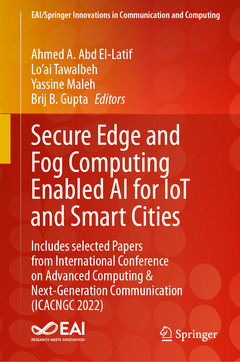Secure Edge and Fog Computing Enabled AI for IoT and Smart Cities , 1st ed. 2024 Includes selected Papers from International Conference on Advanced Computing & Next-Generation Communication (ICACNGC 2022) EAI/Springer Innovations in Communication and Computing Series
Coordonnateurs : Abd El-Latif Ahmed A., Tawalbeh Lo’ai, Maleh Yassine, Gupta Brij B.

This book gathers recent research in security and privacy to discuss, evaluate, and improve the novel approaches of data protection in IoT and edge and fog computing. The primary focus of the book addresses security mechanisms in IoT and edge/ fog computing, advanced secure deployments for large scaled edge/ fog computing, and new efficient data security strategy of IoT and edge/ fog computing. The book lays a foundation of the core concepts and principles of IoT and 5G security, walking the reader through the fundamental ideas. This book is aimed at researchers, graduate students, and engineers in the fields of secure IoT and edge/ fog computing. The book also presents selected papers from International Conference on Advanced Computing & Next-Generation Communication (ICACNGC 2022).
Ahmed A. Abd El-Latif (SMIEEE, MACM) received the B.Sc. degree with honour rank in Mathematics and Computer Science in 2005 and M.Sc. degree in Computer Science in 2010, all from Menoufia University, Egypt. He received his Ph. D. degree in Computer Science & Technology at Harbin Institute of Technology (H.I.T), Harbin, P. R. China in 2013. He is an associate professor of Computer Science at Menoufia University, Egypt, and at EIAS Data Science Lab, College of Computer and Information Sciences, Prince Sultan University, Saudi Arabia. In more than 17 years of his professional experience, he published over 260 papers in journals/conferences including 10 books with over 8800 citations. He was also selected in the 2022, 2021 and 2020 Stanford University's ranking of the world's top 2% scientists. He involved in government and international funded R&D projects related to the widespread use of artificial intelligence for 5G/6G networks. He received many awards, State Encouragement Award in Engineering Sciences 2016, Arab Republic of Egypt; the best Ph.D. student award from Harbin Institute of Technology, China 2013; Young scientific award, Menoufia University, Egypt 2014. He is a fellow at Academy of Scientific Research and Technology, Egypt. His areas of interests are Cybersecurity, 5G/6G Wireless Networks, Post-Quantum Cryptography, Artificial Intelligence of Things, AI-Based Image Processing, Information Hiding, Dynamical systems (Discrete-time models: Chaotic systems and Quantum Walks). He is the leader of mega grant program "Research of network technologies with ultra-low latency and ultra-high density based on the widespread use of artificial intelligence for 6G networks". Dr. Abd El-Latif is the chair/co-chair of many Scopus/ EI conferences. He is the EIC of International Journal of Information Security and Privacy, and series editor of Advances in Cybersecurity Management. Also, academic editor/ associate editor for set of indexed
Discusses, evaluates, and improves approaches in data protections in IoT and edge/ fog computing
Lays a foundation of the core concepts and principles of IoT and 5G security for edge/ fog computing
Includes selected papers from ICACNGC 2022
Date de parution : 04-2024
Ouvrage de 256 p.
15.5x23.5 cm



